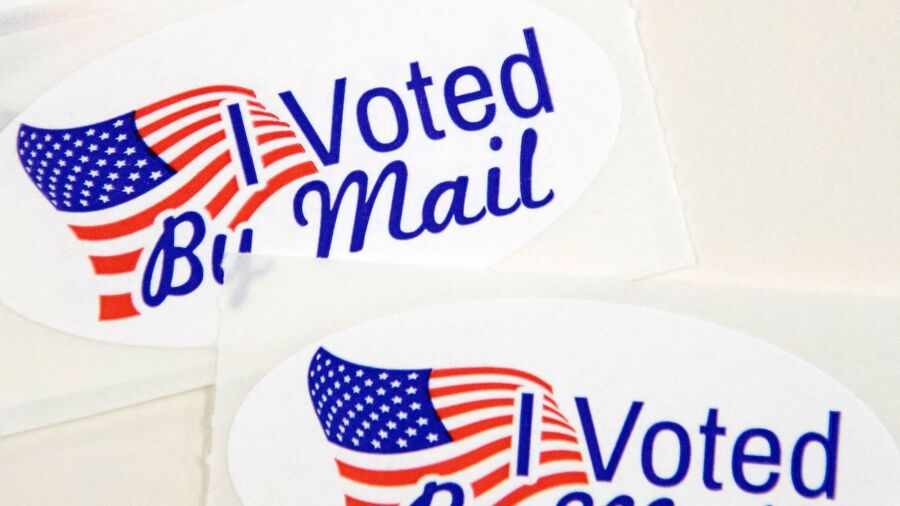A federal appeals court has ruled that Pennsylvania election officials should throw out mail-in ballot envelopes with missing or erroneous dates.
In a 2-1 decision on Wednesday, a panel of the U.S. Court of Appeals for the Third Circuit upheld state election laws requiring mailed-in ballot envelopes to include an accurate handwritten date. The appeal’s court ruling reverses a lower federal court ruling.
The ballot case stems from a dispute over a state election law passed in 2019. Republican party organizations argued that while the 2019 law expanded mail-in voting, it included a key compromise that mail-in voters should correctly date their ballot envelopes. Despite this compromise, then-acting Secretary of State Leigh Chapman (D) had wrongfully directed state election officials to count undated and wrongly dated mailed ballots.
Just days before the 2022 midterm election, the state Supreme Court ordered Pennsylvania election officials to refrain from counting ballots mailed in undated or incorrectly dated envelopes. As a result of this order, some 10,000 mailed ballots were rejected during the Nov. 8, 2022 election.
After this November 2022 Pennsylvania Supreme Court ruling but before the election, the Pennsylvania Conference of the National Association for the Advancement of Colored People (NAACP) filed a federal lawsuit to reverse the state Supreme Court’s ruling, arguing it goes against the 1964 Civil Rights Act.
The Materiality provision of the 1964 Civil Rights Act specifies that ballots cannot be rejected over an “error or omission” on paperwork “related to any application, registration, or other act requisite to voting” if the mistake is “not material in determining whether [an] individual is qualified” to vote. The NAACP’s lawsuit argues dating errors on mailed ballot envelopes constitute the types of “immaterial paperwork errors or omissions” for which the Civil Rights Act protects from disqualification and rejection.
The opinion from the appeals court comes forward as Pennsylvania appears set to be a key battleground state in the 2024 election cycle.
Judge Says Date Requirement Key to Showing Ballot Was Validly Cast
Writing for the majority, Circuit Judge Thomas Ambro concluded the Materiality provision of the 1964 Civil Rights Act “only applies when the State is determining who may vote,” whereas the requirement for a voter to accurately date the envelope containing a mailed ballot is not focused on who may vote but on how the vote must be cast.
Judge Ambro, an appointee of President Bill Clinton, further noted the date indication on an envelope for a mailed Pennsylvania ballot is used in conjunction with a signature line by which mail-in voters declare they are qualified to vote, have not already voted by another means, and understand they can’t also cast another ballot at their designated physical polling location.
“That signed and dated attestation is used to determine whether the ballot is validly cast, not whether the individual is qualified under state law to vote,” Judge Ambro wrote.
Circuit Judge Patty Schwartz, writing her dissenting opinion, argued the majority had too narrowly interpreted the Materiality provision of the 1964 Civil Rights Act.
“Today’s ruling is a clear reminder that all voters must carefully review and comply with every instruction and requirement imposed upon them. If they do not, they risk having their otherwise valid votes discounted based on even the most inconsequential mistake,” wrote Judge Schwartz, an appointee of President Barack Obama.
“One can only hope that election officials do not capitalize on the Majority’s narrow interpretation of the Materiality Provision by enacting unduly technical and immaterial post-registration paperwork requirements that could silence the voices of qualified voters,” she continued.
Activists Weigh Impact of Ruling, Next Steps
The election activists who brought the lawsuit seeking to have undated and incorrectly dated ballot envelopes counted expressed disappointment with the federal appeals court’s ruling on Wednesday.
“Though this ruling will undoubtedly have a negative impact on elderly voters and voters of color, we will work with partners to ensure that voters across the state of Pennsylvania know how to make sure their votes are counted,” said Philip Hensley-Robin, executive director of Common Cause Pennsylvania, a group that joined the NAACP in its lawsuit.
Ari Savitzky, a senior staff attorney with the ACLU’s Voting Rights Project, said the court’s majority ruled “that voters may be disenfranchised for a minor paperwork error like forgetting to write an irrelevant date on the return envelope of their mail ballot.”
“We are considering all of our options at this time,” the ACLU attorney added. “And we will not stop fighting for voters.”
Restoring Integrity and Trust in Elections (RITE), an organization that supported the 2022 Pennsylvania Supreme Court’s ruling, celebrated the federal appeals court decision affirming that prior state-level ruling.
“Too many voters doubt the integrity of elections because of an unrelenting assault on election laws from left-wing partisan litigators,” said RITE president Derek Lyons. “The court’s ruling today is a clear statement that state legislatures, not courts, should make election laws. RITE is proud to have played a supporting role in this case.”


